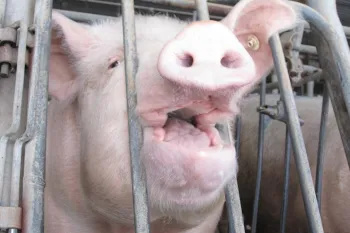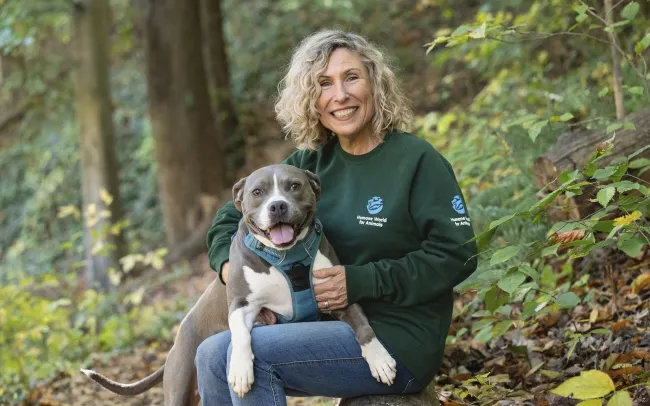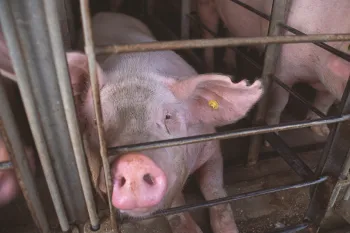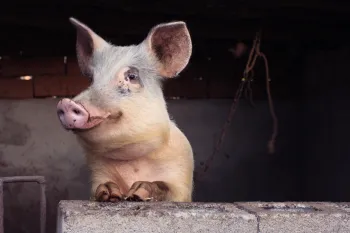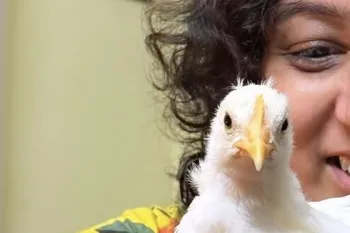A scandal in the pork industry is suggesting the true motives behind the attack on voter-supported farmed animal welfare laws: In a settlement of a federal class-action lawsuit, disclosed in late September, Tyson Foods agreed to pay $85 million to address allegations of price-fixing in the pork market, the largest-ever settlement of its kind.
Meanwhile, in an insult to voters and to the public, the National Pork Producers Council and its allies continue their assault on California’s Proposition 12, considered the strongest law for the protection of farmed animals in the U.S., with willfully misleading claims about its effects on prices at the grocery store, among other things. Yet, right now, with one of the largest price-fixing scandals in the history of pork production unfolding, the NPPC’s got nothing to declare.
The NPPC’s silence on price-gouging is simply galling, for it has been blathering away about the alleged price impacts of Proposition 12 on consumers for years now. It’s prepared to tell lies about Proposition 12, but when it comes to the real drivers of price inflation, like avian flu and, in this case, the likely impacts of industry-led price-gouging, it goes dark.
Proposition 12 establishes basic humane protections for animals, prohibiting the sale in California of meat and eggs that come from farming systems that keep animals in cruel and extreme cage confinement too small for the animals to turn around or move even a few inches in any direction: pigs locked in gestation crates, hens crowded into battery cages and veal calves crammed into crates. The law was supported by California voters and has been upheld in multiple legal challenges, including in the Supreme Court of the United States back in 2023.
Many farmers have already transitioned to cage- and crate-free systems, and the United Egg Producers (whose members produce more than 90% of eggs in the U.S.) has voiced opposition to efforts to block Proposition 12. And yet the NPPC is determined to maximize profits by promoting the cheapest and cruelest methods of factory farming possible.
The litigation involved goes back more than six years, and in it, plaintiffs claimed that between 2009 and 2018, Tyson, the largest U.S. meatpacker, conspired with rival companies to inflate pork prices by limiting supply. For nearly a decade, in other words, these corporations allegedly colluded in a scheme that ensured higher grocery bills for consumers and billions of dollars in additional profits for the big players.
The class-action settlement agreed to by Tyson surpasses the $75 million settlement agreed to by Smithfield Foods in 2022 on similar price-fixing charges. These are not the only of this kind, as other litigation that targets alleged price-fixing in the pork, beef and chicken industries is pending.
This scandal shows that the fight over Proposition 12 has never been about making meat more affordable for the public. More and more producers are converting to higher welfare systems, and that just makes good business sense, given the fact that major grocery corporations, restaurant chains, distributors and food service providers have embraced substantive animal welfare commitments, understanding that it’s what their customers want.
Humane World for Animals has played a crucial role in holding the industry accountable for taking advantage of consumers and farmers. For example, in 2008, when major agricultural industry players complained that California’s first farm animal ballot initiative, Proposition 2, would be too costly for consumers—a tune that sounds awfully similar to the one the NPPC is singing about California’s Proposition 12 now—our Animal Protection Law team uncovered numerous violations of antitrust laws. We filed legal petitions with the U.S. Department of Justice and the Federal Trade Commission, providing evidence that industry collusion, not humane reforms, was driving prices up. The dozens of class action cases subsequently filed were eventually consolidated and resulted in producers paying $50 million in damages, a result that makes the later allegations of industry price manipulation less surprising, if not still shocking. More recently, our team sued over the misuse of millions of dollars in federal commodity promotion funds by the NPPC, and a federal court agreed that the money was being used for impermissible lobbying purposes rather than generic commodity promotion purposes that could also benefit small and independent farmers using more humane methods of pork production.
Some segments of the pork industry are cementing their reputation as monopolistic actors determined to control pricing and maximize profit in the $27 billion U.S. market even when it hurts consumers and farmers, and even when it poses a risk of driving inflationary pressures throughout the economy.
These price-fixing settlements by some of the biggest players in the industry are front-page news. All the while, Big Pork is treating elected officials and members of the public as little more than data points in its unyielding drive for profits; handwringing over Proposition 12 is merely a diversion.
Big Pork and its principal trade association resist Proposition 12 because the law, along with similar measures enacted in over a dozen other states, has ushered in a vital new era of innovation and industry competition, along with a higher regard for public health, animal welfare and consumer choice.
The big players in the industry and lobbying associations such as the NPPC hate that evolution. They’d rather serve their monopolistic interest, stifle innovation and perpetuate the old status quo—the bottom-of-the-barrel animal welfare standards and all of the social, economic, environmental and public health costs that come with them—the one they’ve chosen to defend even as the world around them changes.
Kitty Block is president and CEO of Humane World for Animals. Follow Kitty Block on X. Sara Amundson is president of Humane World Action Fund.
